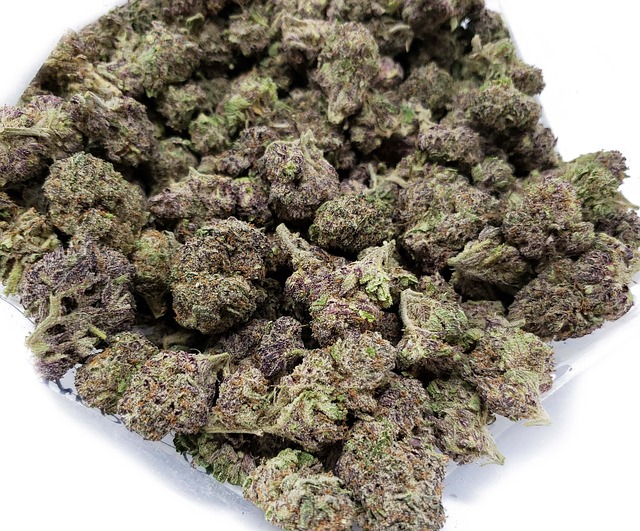The THCA flower, a non-psychoactive compound found in cannabis plants and precursor to THC, has garnered attention for its potential health benefits, which include anti-inflammatory, neuroprotective, and analgesic effects. Unlike its heated counterpart, THC, THCA does not induce a psychoactive high, making it suitable for individuals seeking wellness support without mind-altering effects. The therapeutic properties of THCA are believed to interact with the endocannabinoid system, which regulates various bodily functions, potentially offering relief from conditions like neuropathic pain and autoimmune disorders. Research is ongoing to further understand its mechanisms and applications. Consumers can ingest THCA flower in various forms, such as vaporizing or edibles, allowing for a range of personalized wellness experiences. As the legal status of THCA flower varies across different states within the U.S., it's essential for consumers to stay informed about local regulations to legally and safely access its potential health benefits. The integration of THCA flower into daily routines offers a natural approach to enhancing overall health and wellbeing, with a focus on supporting cognitive function and managing everyday discomfort or chronic pain conditions.
Explore the emerging wellness trend centered on the potential health and well-being advantages of THCA flower, a non-psychoactive cannabinoid found in hemp and marijuana plants. Our comprehensive article delves into its therapeutic properties, shedding light on how it may benefit your daily life. From its scientifically backed effects to practical ways to incorporate it into your routine, we navigate the legal considerations surrounding its use. Join us as we uncover the thca flower effects and benefits that are piquing interest in health circles globally.
- Unlocking the Potential of THCA Flower: An Overview of Its Benefits
- The Science Behind THCA Flower: Understanding Its Effects on Health and Well-being
- THCA Flower in Practice: How It Can Be Incorporated into Daily Routines for Optimal Health
- Navigating the Legal Landscape: The Status of THCA Flower and Its Implications for Consumers
Unlocking the Potential of THCA Flower: An Overview of Its Benefits

The THCA flower, which stands for Tetrahydrocannabinolic Acid, is a non-psychoactive cannabinoid found in raw cannabis plants that holds promise for its potential health benefits. As researchers continue to explore the effects and benefits of THCA, preliminary studies suggest that it may offer various therapeutic properties without the psychotropic effects associated with its decarboxylated form, THC. THCA is believed to exhibit anti-inflammatory, neuroprotective, and analgesic effects, making it a subject of interest for individuals seeking alternative wellness solutions. Preliminary research indicates that THCA may interact with the body’s endocannabinoid system, influencing pain, inflammation, and the immune response without the high typically associated with cannabis consumption. Its potential applications span a wide range of conditions, from neuropathic pain to autoimmune disorders, showcasing the broad spectrum of its possible health benefits.
Furthermore, the THCA flower’s effects and benefits are attributed to its unique interaction with the body’s cannabinoid receptors, particularly CB1 and CB2. Unlike THC, which is its decarboxylated form after heating, THCA does not bind as strongly to these receptors, which may explain why it lacks psychoactive effects. This distinction makes THCA a compelling subject for therapeutic research, as it offers the potential for targeted health benefits without cognitive impairment. Users often consume THCA flowers in their raw form through various methods, including smoking, vaporizing, or infusing them into edibles, thereby preserving its natural benefits and avoiding the psychoactive impact of its degraded form. As scientific understanding of THCA continues to evolve, its role in holistic health practices may become increasingly significant.
The Science Behind THCA Flower: Understanding Its Effects on Health and Well-being

The THCA flower, a precursor to tetrahydrocannabinolic acid (THC), the psychoactive component of cannabis, has garnered attention for its potential health and well-being effects. THCA, or tetrahydrocannabinolic acid, exists in raw or uncured cannabis plants and possesses distinct properties that may influence human health positively. Scientific research indicates that THCA interacts with the body’s endocannabinoid system, a complex cell-signaling system identified as a key regulator of homeostasis, which affects a range of functions and processes, including fertility, appetite, memory, and pain sensation. Studies suggest that THCA may offer anti-inflammatory, antioxidant, and neuroprotective benefits without the psychoactive effects associated with THC. Its potential therapeutic applications include alleviating symptoms of various conditions such as inflammation, nausea, glaucoma, and neuropathic pain, due to its interaction with the CB1 and CB2 receptors within the endocannabinoid system. Furthermore, THCA’s effects on health and well-being are being explored for their potential in managing stress, anxiety, and improving sleep quality, highlighting the multifaceted benefits of this cannabinoid. As research continues to evolve, the understanding of THCA flower’s effects and benefits becomes clearer, offering promising insights into its role in holistic health and well-being strategies.
THCA Flower in Practice: How It Can Be Incorporated into Daily Routines for Optimal Health

Integrating THCA flower into daily routines can offer a myriad of potential health benefits, thanks to its unique cannabinoid profile. Tetrahydrocannabinolic acid (THCA) is the raw, non-psychoactive precursor to THC, the primary psychoactive component found in cannabis. THCA flower effects are widely studied and suggest that it may have anti-inflammatory, neuroprotective, and analgesic properties. Users often report incorporating THCA flower into their wellness regimen through various consumption methods such as vaporizing or infusing it into edibles. For those seeking relief from everyday aches or chronic pain, THCA’s anti-inflammatory benefits can be particularly beneficial when used at the onset of discomfort. Additionally, its potential neuroprotective effects make it a popular choice for individuals looking to support cognitive health as part of their daily routine.
For optimal health, many proponents of THCA flower advocate for mindful and consistent use. This means thoughtfully selecting the appropriate dosage and consumption method that aligns with individual needs and preferences. For instance, those who prefer a more immediate onset of effects might opt for vaporizing, while others who are looking for long-lasting benefits might choose to bake it into a meal. The versatility of THCA flower allows for its seamless integration into lifestyle choices, providing a natural and holistic approach to health and wellness. Whether used in the morning to set a positive tone for the day or in the evening to aid in relaxation and better sleep, the benefits of THCA flower can be tailored to fit individual health goals when incorporated into a consistent daily routine.
Navigating the Legal Landscape: The Status of THCA Flower and Its Implications for Consumers

Navigating the complex legal landscape surrounding THCA flower requires a nuanced understanding of state and federal laws in the United States. Unlike its psychoactive counterpart, delta-9-THC, THCA is found in raw or uncured cannabis flowers and possesses a distinct set of effects and benefits. As of the current regulatory framework, THCA itself is federally legal under the 2018 Farm Bill, which classified derivatives of hemp with less than 0.3% delta-9-THC as legal on a federal level. However, state laws can vary significantly, with some states allowing the sale and use of THCA flower for medical or adult recreational use, while others maintain strict restrictions. This patchwork of regulations poses challenges for consumers seeking to legally purchase and enjoy THCA flower’s potential benefits. The effects attributed to THCA are numerous and promising; they include anti-inflammatory, neuroprotective, and analgesic properties without the psychoactive high typically associated with THC. As such, THCA flower is being explored for its therapeutic potential in managing pain, reducing inflammation, and protecting against neurological disorders. Consumers interested in exploring the benefits of THCA must prioritize staying informed about the evolving legal status within their jurisdiction, ensuring compliance with local laws to safely access these products. The implications for consumers are clear: a thorough understanding of the legal landscape is essential for anyone considering THCA flower as part of their wellness regimen.
THCA flower emerges as a promising wellness resource, offering a spectrum of potential health benefits backed by scientific research. As explored in this article, from understanding its therapeutic properties to integrating it into daily life, the thca flower holds significant promise for those seeking natural alternatives to enhance their well-being. Navigating the legal landscape is crucial for consumers, ensuring access while respecting local regulations. Incorporating THCA flower into one’s routine may offer considerable effects and benefits, positioning it as a valuable addition to holistic health practices.


